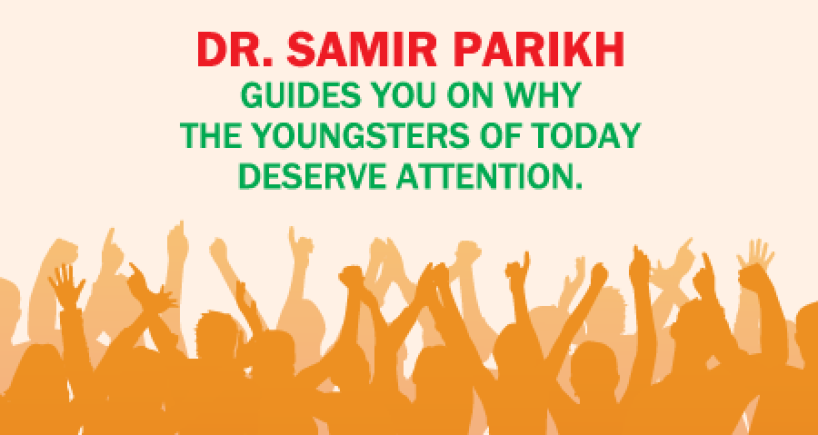
International Youth Day

The future of a nation is often said to be in the hands of the youth, and therefore, on the International Youth Day, it becomes necessary to spare some thought towards the youngsters of our country. In fact, the progress of the society can be assessed as being reflected in these youngsters’, including their health, education, and overall well-being. As a mental health professional, the importance of the psychological well-being of the children and adolescents seems to be eye-catchingly evident. The phase of adolescence has widely been recognized as a critical period of rapid development, and which are likely to have a significant impact on both the physical as well as mental health of the adolescents. The transition between childhood and adulthood comes with many challenges alongside their physical, cognitive, as well as social development.
Facts and Figures
A glance at the rising statistics suffices to indicate the growing prevalence of mental illnesses, especially amongst the children and adolescents. Depression is one of the most common mental health related illnesses to affect a person and is found in people of all ages including children and adolescents, with about 11 percent adolescents having had a depressive disorder by age 18 (NIMH). Suicide was the second leading cause of death among 15-29 year olds globally in 2012 and this trend continues to rise even today (WHO). Moreover, it is estimated by the Centres for Disease Control and Prevention (CDC) that at least 25 attempts are made for every completed teen suicide. According to the NIMH, eating disorders affect 2.7% of 13 to 17 year olds worldwide (2010). Adolescent substance use has become one of the major areas of concern in India, with an estimate of 50% boys having tried at least one substance by the ninth grade (1991). Moreover, according to a recent study in India, easy availability and relief from tension were the most frequent reasons reported for the continuation of substance use, with media being stated as the most frequent source of information (Tsering et al, 2010).
Mental Health of the Youth
Considering the physical and emotional changes that occur in adolescence, it is natural for these emotions and feelings to be experienced very intensely, thereby leading to a vulnerability towards an adverse impact on their mental health. When teenagers go through difficult emotions such as loneliness or extremely stressful situations that have grave ramifications on their self-esteem and self-concept, they can be driven to self-harm or even suicide.
In the light of the glamorization promoted by the media, it’s no wonder that body image concerns and eating disorders are becoming prominent in the youth today. Young minds are known to be the most susceptible. It is not surprising, as most of us, especially youngsters, have begun to define and value themselves and others based on the brands they wear and the model of mobile phones that they carry. Such ideologies are likely to create feelings of inadequacy and relative deprivation, thereby creating a sense of discrepancy between one’s perceived as well as ideal self.
Teens are given to be experimental with many risk taking behaviours including the use and abuse of drugs and alcohol. More often than not, addiction sneaks up on the adolescent with a gradual increase in the use of substances as they begin to fulfil a valuable need in the eyes of the user – this need could be anything from mood elevation to pain relief. Some teenagers may turn to substances simply out of curiosity or even as a faulty coping mechanism to deal with their feelings of loneliness, depression, stress or anxiety, or to cope with family related problems and stressors.
Finally, today’s youth is almost notorious for having adopted their own lifestyle. In the midst of their hectic schedules and priorities, following a regular routine is usually neglected. And this ends up having adverse impacts on both their physical as well as mental health in the long-term, influencing their personal, social, academic as well as occupational functioning. A disciplined and healthy lifestyle is very beneficial in maintaining mental health. An adequate sleep, a proper diet, staying away from substances, and regular physical exercise would help us stay physically as well as mentally fit.
The Way Forward
Despite an increasing prevalence and awareness, mental disorders in adolescents are mostly under-reported, and hence adequate and timely help is not always able to reach those who need it, particularly in the underprivileged segments of the society. A major hindrance to the timely treatment of the condition is also the lack of understanding and knowledge which could facilitate timely identification. The need of the hour is to encourage education about the mental health issues surrounding the youth of the country. This is especially important as many times such issues are neglected as being a typical by-product of adolescence itself. It is important to recognize these as diagnosable disorders which can be effectively treated, and which could have adverse long-term consequences if neglected.
Besides identification, we must be open to seeking help. It is important to help our society overcome the stigma attached to mental health, and to encourage children and adolescents to be able to reach out to trained professionals. Moreover, it is vital to bring about a change in the way our society thinks about the youth and their mental health. The need of the hour today is to strongly advocate the preventive as well as curative aspects of mental health. Engagement with parents, schools as well as communities should be promoted to empower them for the timely identification as well as encourage resilience, emotional regulation, social skills, and healthy coping mechanisms for the youth. The best model to build is an integration of private-public partnerships, so we all could join forces to work towards targeting the very grass-root levels, not only help preventing mental health issues but also improve the psychological well-being of children and adolescents.
Categories
Clear allMeet the doctor

- Mental Health and Behavioural Sciences | Mental Health and Behavioural Sciences | Psychiatry | Clinical Psychology
-
21 Years
-
900



















